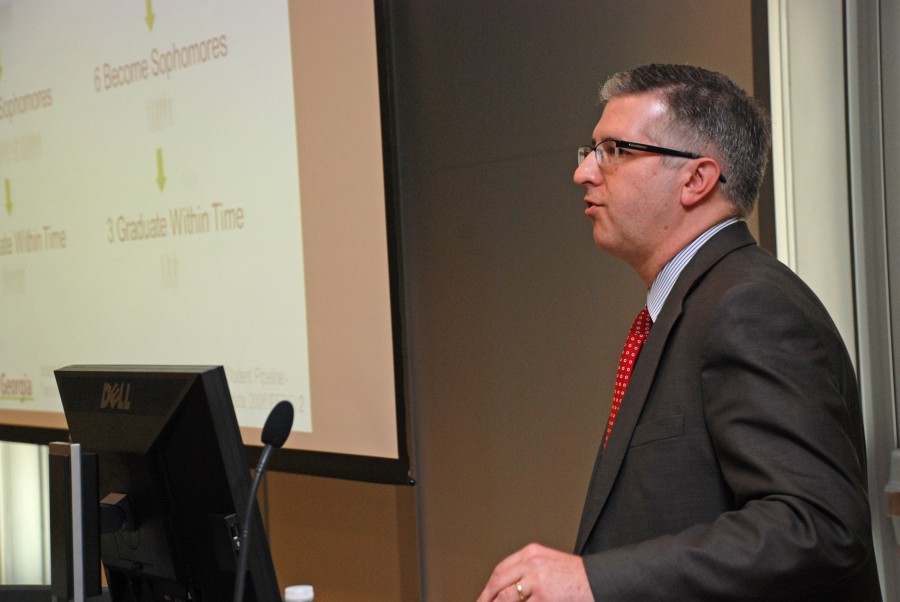Over 100 people were in attendance to hear the plan, which was crafted by UNG as part of the Complete College Georgia initiative announced by Governor Nathan Deal in 2011.
Following a 2011 Georgetown University study that showed that Georgia must raise the amount of individuals with some level of college completion from 42% to 60% in order to meet projected future workforce needs, Complete College Georgia was implemented with the goal of adding 250,000 postsecondary graduates to the state's workforce by 2020.
UNG, along with the University System of Georgia's (USG) 30 other member institutions, developed its plan last year and has begun to implement several core tenets of the strategy.
Dr. Houston Davis, USG executive vice chancellor and chief academic officer, delivered the keynote speech at today's meeting, during which he emphasized how crucial it is that the Complete College Georgia initiative be carried out successfully: "This isn't about educational attainment just for the sake of educational attainment. This is an imperative for the state of Georgia, if we want to continue being healthy economically, culturally and socially. If we want the people of our state to be able to realize their full potential, this completion agenda is something that we absolutely have got to work for, because it is about positioning the state for the future," he said.
Davis pinpointed two key strategies for raising the overall education level of Georgia's workforce: assisting adults in obtaining or completing college degrees and certificates to strengthen the current workforce, and ensuring high school graduates are prepared for college in order to bolster the state's future workforce.
Davis said it would require the cooperation of Georgia's entire education system in order to achieve these goals.
This sentiment resonated with UNG's Senior Vice President for University Affairs Dr. Al Panu, who is the university's lead administrator on Complete College Georgia: "The completion agenda is bigger than any one entity. It is going to take partnership and collaboration to achieve this goal," he said.
During his speech, Davis spoke specifically about UNG's plan, lauding the university's efforts to not only increase the overall success of its students, but also to increase the education level across all of north Georgia.
"I can't thank this university enough for the work that you've done, both on consolidation and your completion plan. Your plan was one of the ones held up as exemplary in the USG's peer review process," he said.
Davis also addressed how UNG's recent consolidation and range of available programs proved a valuable asset to not only area students, but the Complete College Georgia initiative as whole. He added: "We really are proud to have the University of North Georgia as a partner in this, and I believe you are going to serve as a model for many of the schools in the university system."
Building on prior efforts to increase retention and graduation rates, UNG's plan involves five key strategies: kindergarten through 12th grade partnerships focused on ensuring the college readiness of high school graduates; expanding access to university programs, with an emphasis placed on reaching underserved areas; reducing the overall time required to complete a college degree; transforming remediation; and developing new methods of instruction of learning comprehension.

"This isn't about educational attainment just for the sake of educational attainment. This is an imperative for the state of Georgia, if we want to continue being healthy economically, culturally and socially," Davis said. "If we want the people of o
http://accesswdun.com/article/2013/3/259878
